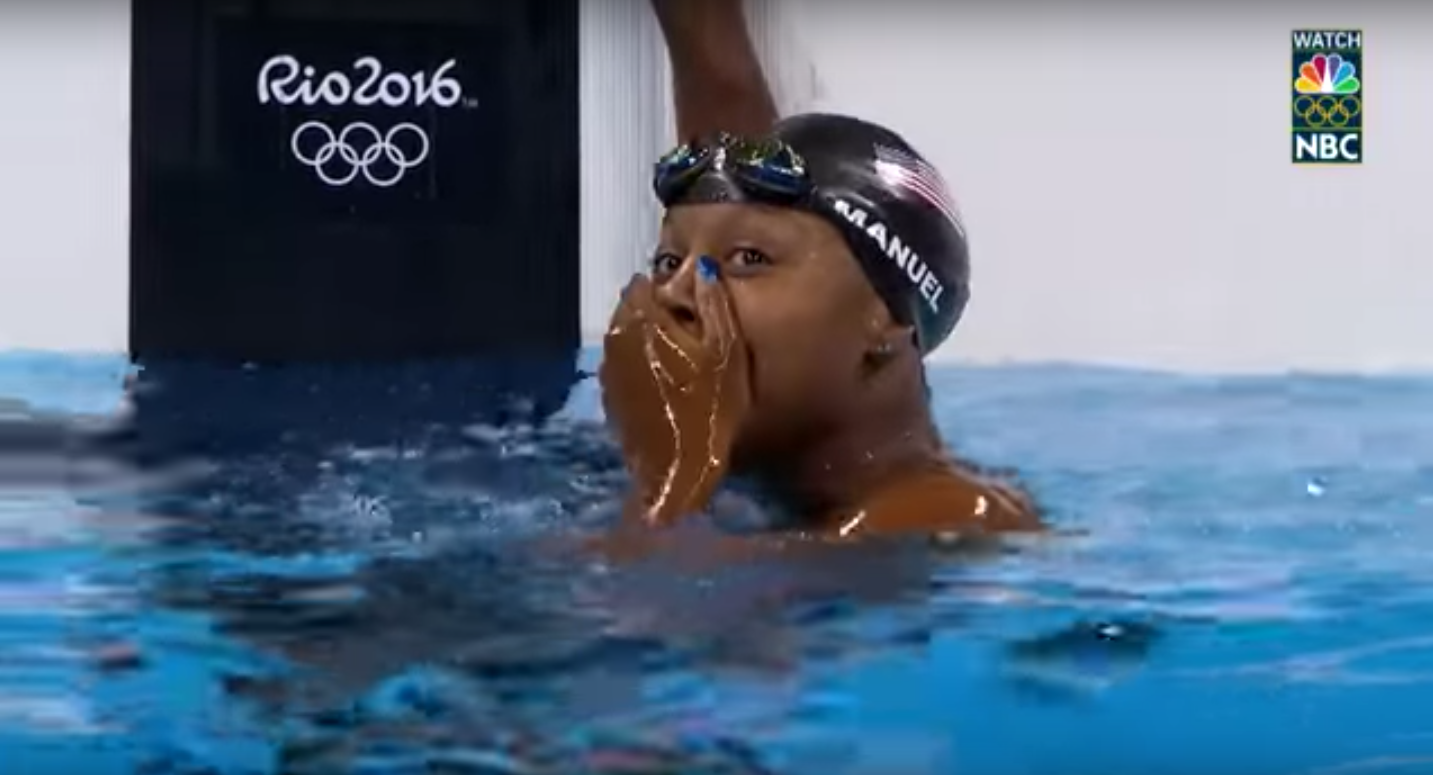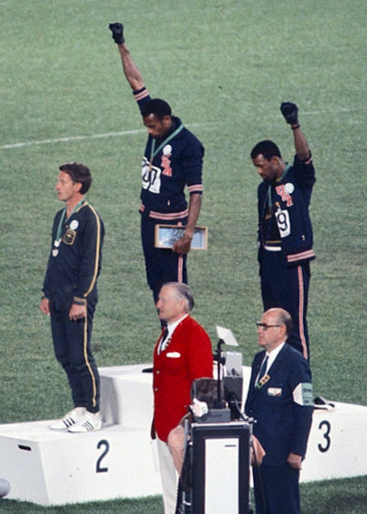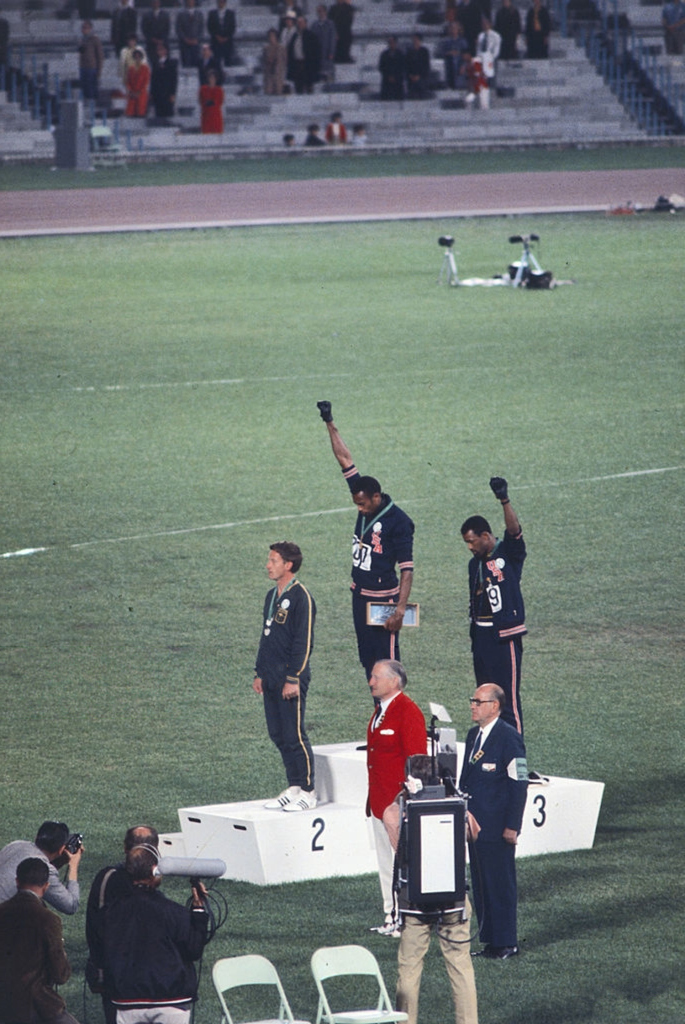3 Times Olympians Made Political Statements

By:
Most athletes in the 2016 Rio Olympics have avoided making any controversial political statements so far. Gabby Douglas strongly denied trying to make a political statement when she didn't put her hand over her heart during the national anthem. Venus Williams refused to answer reporters' questions about Black Lives Matter and Donald Trump.
"I don't involve myself in politics," Williams said at a press conference, according to USA Today.
However, historic Olympian Simone Manuel, the first black woman to win any medal in an individual swimming event, made a strong statement about Black Lives Matter this week in Rio.
 Youtube/NBC Sports - youtube.com
Youtube/NBC Sports - youtube.com
"It means a lot, especially with what is going on in the world today, some of the issues of police brutality," Manuel said. "This win hopefully brings hope and change to some of the issues that are going on. My color comes with the territory."
Other athletes have also made strong verbal and symbolic political statements in past Olympic games.
Here are three times Olympians made a political statement to stand up for social justice:
1. Olympic athletes gave the black power fist during the 1968 Mexico City Olympic Games.
 Wikimedia Commons/ Angelo Cozzi (Mondadori Publishers) - wikimedia.org
Wikimedia Commons/ Angelo Cozzi (Mondadori Publishers) - wikimedia.org
Track and field Olympians Tommie Smith and John Carlos arguably created the most iconic political image from past Olympics. At that time in 1968, the Civil Rights Movement was in a critical period and Martin Luther King, Jr. had been assassinated only months before the Mexico City games. At the same time, the Black Power Movement was emerging in the U.S. as a more militant movement to fight for civil rights.
Smith won the gold medal and Carlos won the bronze for the U.S. in the 200-meter race, and an Australian runner won the silver medal. During the national anthem, both American runners raised their fists to symbolize black power and to protest racial inequality in the U.S.
 Wikimedia Commons/Angelo Cozzi (Mondadori Publishers) - wikimedia.org
Wikimedia Commons/Angelo Cozzi (Mondadori Publishers) - wikimedia.org
They both wore black socks and no shoes to symbolize the poverty of black Americans, beads and scarves to memorialize lynching victims, and one black glove to honor black unity, according to the Smithsonian.
"If I win I am an American, not a black American, but if I did something bad then they would say 'a Negro'," Tommie Smith said at a post-ceremony press conference, according to the BBC. "We are black and we are proud of being black. Black America will understand what we did tonight."
2. President Barack Obama sent LGBT athletes instead of presidents to Russia.
The Sochi 2014 Winter Olympics put a spotlight on Russia's anti-gay laws, and the Obama administration sent shade Russia's way with its choice for a U.S. delegation. No U.S. presidents or vice presidents were included in the delegation for the first time since 2000, but openly gay athletes were sent instead, according to ESPN. Olympian, tennis icon, and LGBT advocate, Billie Jean King was one of the athletes sent in the presidential delegation.
She wrote an opinion piece for CNN about global gay rights and the delegation.
"I want the LGBT community living in Russia to know they are not alone and I hope others realize this is not only a gay rights issue, but a global concern for human rights and equality," she wrote for CNN.
3. A black American Olympian dominated in the 1936 Berlin Olympics.
Jesse Owens wasn't trying to be political when he went to to the Olympics, but his record-breaking run of gold medals in Nazi Germany was an insult to Aryan obsessed Chancellor Adolf Hitler, and a symbol of strength for black people at home.
Although the broader world may not have realized the mass genocide to come in Germany, Hitler's Nazi Party had already started rampant discrimination based on views of racial superiority, according to NPR. American politicians and athletes threatened to boycott the Olympics because of Germany's treatment of Jews.
However, there was also racial tension within the U.S. Racial segregation of white and black people was law and discrimination against Jews was common."Jim Crow" laws, as they were commonly called, were apartheid laws that formally segregated schools, parks, water fountains, buses, and other public spaces from the late 1880s to the mid-1950s.
"The story gets a little more complicated when we start presenting the question of the boycott debate in the United States against the backdrop of what was happening in our very own country," Susan Bachrach, from the United States Holocaust Memorial Museum, told NPR. "[There was] racism and the era of Jim Crow [and] discrimination against black athletes. ... [And] this [time] was really the height of anti-Semitism in America."
Despite the boycott threats, the U.S. sent a team anyway, including black athletes like Owens. Owens won four gold medals in front of the infamous Aryan supremacist, tying one world record and breaking three. The last medal and world record was a team effort in the relay.
Owens became an American hero, and Hollywood made a film about his success at the Berlin Olympics.
There were other important politically motivated incidents at the Olympics worth mentioning, but they didn't involve social justice statements from athletes.
1972 Munich Olympics
A Palestinian terror group called Black September took 11 Israeli Olympic athletes and coaches hostage and then killed them over the course of two days white the world watched. It was the first time a terror attack was reported and broadcast live worldwide, according to TIME.
1980 Moscow Olympics and the 1984 Los Angeles Olympics
 Youtube/Flash Back - youtube.com
Youtube/Flash Back - youtube.com
Because the former Soviet Union and the U.S hosted Olympic games consecutively during the Cold War, the governments took turns boycotting each other. President Jimmy Carter announced that the U.S. would boycott the 1980 Moscow Olympics because the Soviet Union would not withdraw from Afghanistan. When it was time for the 1984 summer Olympics hosted by the U.S., the Soviet Union returned the slight and boycotted it.
1996 Atlanta Olympics
With the intention to make an anti-abortion statement, Eric Robert Rudolph left a 40-pound bomb filled with screws and nails in Centennial Olympic Park. The blast killed two people and wounded more than 100 other people, according to CNN. One person was killed by the explosion and the other died from a heart attack. Rudolph was also convicted of previous bombings at an abortion clinic in Birmingham, Alabama and three other places in Atlanta.
